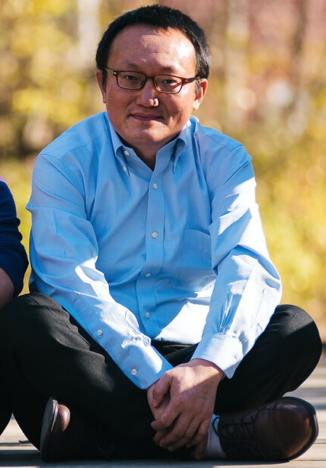You have /5 articles left.
Sign up for a free account or log in.

Feng “Franklin” Tao
JusticeforFranklinTao.org
In one of the tiny fraction of federal China Initiative–related cases to make it to trial, a jury last week found University of Kansas chemical engineering professor Feng “Franklin” Tao guilty on three counts of wire fraud and one count of making false statements.
For the China Initiative’s many critics, the Tao verdict did little to nothing to redeem the now-discontinued counterintelligence program.
Michael German, a national security fellow at New York University’s Brennan Center for Justice and a former special agent with the Federal Bureau of Investigation who has written critically about the initiative, said in an interview, “I don’t think anyone doubts that the Chinese government engages in a number of different problematic and criminal activities in the United States, including national security espionage as well as academic espionage.” Yet “the problem with the China initiative from its initiation is that it moved the locus of investigations from economic espionage and other state-authorized criminal activities into an area that they called research integrity, which tried to mirror the way national security agencies look at the transfer of national security information into, or onto, fundamental research—which isn’t intended to be enforced by borders.”
Case in point: Tao, who was arrested and put on unpaid leave from Kansas in 2019. The federal case against him was mostly about alleged fraud, and it didn’t center on espionage at all: Tao was accused of accepting grant money from the National Science Foundation and the Department of Energy while he was working at Fuzhou University in China, and of not disclosing his ties to Fuzhou. Investigators did find emails between Tao and Fuzhou suggesting that he’d seriously considered a faculty appointment there while he was working at Kansas, but he says he ultimately decided against the move.
Peter Zeidenberg, Tao’s lawyer, has said that the federal judge who oversaw Tao’s trial was concerned enough about the verdict to order a briefing about the government’s evidence and to delay scheduling a sentencing hearing. Tao faces up to 20 years in federal prison and a fine of up to $250,000 for wire fraud alone.
In an interview Friday, Zeidenberg said he’s represented dozens of clients implicated by the China Initiative since it launched in 2018, and that Tao’s case is a “perfect example” of “how [federal investigators] are criminalizing a failure to disclose perfectly lawful activity. All the activity he’s alleged to have engaged in and kept in China was all lawful; none of its prohibited … I think it is very dangerous and unprecedented, and I think it’s based on overreaction and fear of China.”
Zeidenberg said Tao’s federal grants predated by up to five years the alleged job at Fuzhou, and that while there was “nothing to disclose” formally based on this timeline, Tao openly collaborated with Fuzhou and even submitted published articles that were the product of this collaboration to the Energy Department as part of his grant progress reports.
Tao’s case did involve one unusual element: he was reported for being a spy by a former graduate student who first allegedly tried to extort him for $300,000 following a disagreement about paper authorship (that graduate student has since returned to China, but she admitted to lying to the FBI before she left, Zeidenberg said). But while Tao only became known to the China Initiative due to the former student, Zeidenberg said, the program has ensnared many other academics with some link to China for making what amount to paperwork errors.
Losing Talent
German declined to speculate on Tao’s guilt or innocence, given the complexities of the particular case, but he said that when he worked at the FBI, there was a saying among colleagues that “nobody’s administratively pure—that if you look hard enough, you’ll find some mistakes somebody’s made on some government document. But that shouldn’t be the purpose of a federal investigation, right, particularly one that was reported to be focused on economic espionage from the Chinese government.”
The Department of Justice has admitted to mission creep and other problems with the China Initiative, and it shut down the program in February, promising to rethink and rebrand it. But not before opening thousands of cases. German and others said that, going forward, the Justice Department needs to consider the impact that merely being under investigation has on academics, and the impact that these investigations have on academe and research more broadly.
Gang Chen, a professor of mechanical engineering at the Massachusetts Institute of Technology, for instance, wrote in a January Boston Globe op-ed about his experience with the China Initiative, which ended with federal investigators saying they couldn’t prove the changes against him, namely grant fraud.
“Around 6:30 a.m. on Jan. 14, 2021, numerous federal agents stormed into my home, woke my wife and daughter from their sleep, handcuffed me, and put me in jail, charging that, in my role as a professor at MIT, I had failed to disclose funding from various Chinese entities,” he wrote. “There is no winner in what seems to me a politically and racially motivated prosecution: My reputation is tarnished, my family suffered, my institute lost the service of a professor and bore the financial burden of my legal defense, U.S. taxpayers’ money was wasted, the ability of the United States to attract talents from around the world has plummeted, and the scientific community is terrified.”
Zeidenberg, Tao’s lawyer, said numerous China Initiative–targeted academics he’s represented have left the U.S. for China or elsewhere, deciding it’s not worth the personal, professional or financial risks of staying and facing being investigated for possible years-old mistakes in their grant records.
A major chilling effect on Asian academics was documented in a survey last year, which found, in part, that 42 percent of U.S.-based Chinese scientists said the China Initiative and related investigations had affected their plans to stay in the U.S., compared to 7.1 percent of non-Chinese scientists. Academics are seeing this play out in their own labs, as well. Qin Yan, associate professor of pathology at Yale University—where cell biologist Haifan Lin was suspended and then quietly reinstated this term, after the Justice Department dropped its China Initiative–related case against him—said that “people are not staying because of the whole environment here.”
“The newer generation of Chinese students, normally they will come here for overseas training and become postdocs, and many of them will stay and contribute to the U.S. economy and industry and academia. They do a lot,” he said. “But we are losing this pool significantly. Right now, if you ask any labs, they’re recruiting. All of them are talking about, ‘We cannot get postdocs; we cannot get good graduate students because of this.’ So if you’re losing talent for this. The country will be not as competitive as other countries.”









